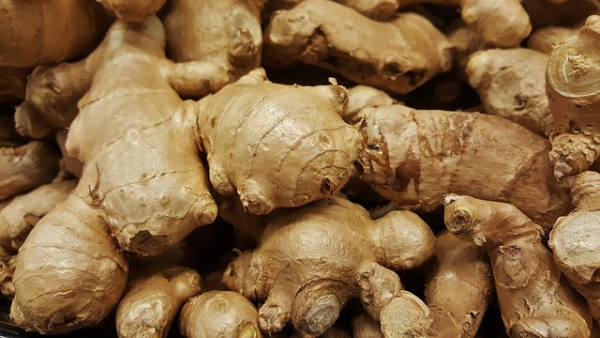Ginger Essential Oil
Zingiber officinale
Ginger Essential Oil blends well with Allspice, citrus oils, Eucalyptus, Frankincense, Geranium, and Rosemary Essential Oils. It should always be diluted for topical applications, in diffuser or when taken orally.
Known Uses
Aids in digestion and gets rid of toxins, relieves respiratory conditions, treats nausea and vomiting, boosts mood, treats muscle aches and joint pain, improves blood circulation and heart health. Ginger Essential Oil is a warming essential oil that works as an antiseptic, laxative, tonic and stimulant. It is an antiseptic that kills infections that are caused by microorganisms and bacteria. This includes intestinal infections, bacterial dysentery and food poisoning. Ginger Oil is also effective against malaria, a mosquito-borne infectious disease.
Ginger Essential Oil removes mucus from the throat and lungs, and is known to heal the common cold and flu and treat a cough, and acts as a natural remedy for bronchitis and helps with loss of breath. It is also considered a natural remedy for asthma. Because of its anti-inflammatory properties, it reduces swelling in the lungs and helps open airways.
Zingibai is a component of Ginger Essential Oil that is responsible for the oil’s anti-inflammatory properties. This component provides pain relief and treats muscle aches, arthritis, migraines and works as a headache remedy and provides relief from menstrual cramps, backaches and soreness. It has the power to reduce cholesterol levels and promotes blood clotting. It is able to decrease age-related oxidative stress markers and reduce oxidative damage. It has been found to be effective in treating alcoholic fatty liver disease.
Ginger Essential Oil increases sexual desire; it addresses issues such as impotence and loss of libido. It has also been used to treat emotional problems like fear, abandonment, and lack of self-confidence or motivation.
History
For over 4,700 years the Chinese and Indians have used ginger medicinally. Ginger was a costly product during the period of the Roman Empire in the first century AD because of its healing properties. It spread across Asia, Africa, Europe and India because of the spice trading business. In the 13th and 14th centuries, the value of a pound of ginger was equivalent to the cost of a sheep! Queen Elizabeth I of England is credited with the invention of the gingerbread man, a well-known Christmas treat. From 1585 on, Jamaican ginger was the first oriental spice to be grown in the New World and imported back to Europe. Today, India is the largest producer of ginger, followed by China, Nepal, Nigeria, Thailand and Indonesia.
Warning
Always test for skin sensitivity prior to use. Excessive use of any oil can lead to skin sensitization. Keep out of eyes, ears, or nose. Test different brands carefully, and never use an oil in a way not recommended by its maker.

